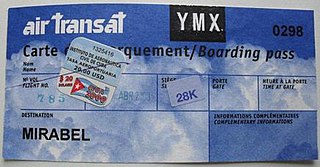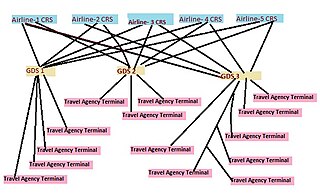The Computer-Assisted Passenger Prescreening System (CAPPS) is a counter-terrorism system in place in the United States air travel industry that matches passenger information with other data sources. The United States Transportation Security Administration (TSA) maintains a watchlist, pursuant to 49 USC § 114 (h)(2), of "individuals known to pose, or suspected of posing, a risk of air piracy or terrorism or a threat to airline or passenger safety." The list is used to pre-emptively identify terrorists attempting to buy airline tickets or board aircraft traveling in the United States, and to mitigate perceived threats.
Computer reservation systems, or central reservation systems (CRS), are computerized systems used to store and retrieve information and conduct transactions related to air travel, hotels, car rental, or other activities. Originally designed and operated by airlines, CRSs were later extended for use by travel agencies, and global distribution systems (GDSs) to book and sell tickets for multiple airlines. Most airlines have outsourced their CRSs to GDS companies, which also enable consumer access through Internet gateways. Modern GDSs typically also allow users to book hotel rooms, rental cars, airline tickets as well as other activities and tours. They also provide access to railway reservations and bus reservations in some markets, although these are not always integrated with the main system. These are also used to relay computerized information for users in the hotel industry, making reservation and ensuring that the hotel is not overbooked.
Hahn Air is a minor German airline headquartered in Dreieich, offering business jet scheduled and charter flights within Europe from its base at Düsseldorf Airport.

A boarding pass or boarding card is a document provided by an airline during airport check-in, giving a passenger permission to enter the restricted area of an airport and to board the airplane for a particular flight. At a minimum, it identifies the passenger, the flight number, the date, and scheduled time for departure. A boarding pass may also indicate details of the perks a passenger is entitled to and is thus presented at the entrance of such facilities to show eligibility.

An electronic ticket is a method of ticket entry, processing, and marketing for companies in the airline, railways and other transport and entertainment industries.
In airline reservation systems, a record locator is an alphanumeric or alpha code used to identify and access a specific record on an airline’s reservation system. An airline’s reservation system automatically generates a unique record locator whenever a customer makes a reservation or booking, commonly known in the industry as an itinerary. When an itinerary is entered into the reservation system it is commonly known as a passenger name record (PNR). An itinerary may be entered into the system by a passenger, travel agent or airline employee.

Amadeus IT Group, S.A. is a major Spanish multinational technology company that provides software solutions for the global travel and tourism industry. It is the world's leading provider of travel technology that focus on developing software for airlines, hotels, travel agencies, and other travel-related businesses to enhance their operations and customer experiences.

A global distribution system (GDS) is a computerised network system owned or operated by a company that enables transactions between travel industry service providers, mainly airlines, hotels, car rental companies, and travel agencies. The GDS mainly uses real-time inventory from the service providers. Travel agencies traditionally relied on GDS for services, products and rates in order to provide travel-related services to the end consumers. Thus, a GDS can link services, rates and bookings consolidating products and services across all three travel sectors: i.e., airline reservations, hotel reservations, car rentals.
Interlining, also known as interline ticketing and interline booking, is a voluntary commercial agreement between individual airlines to handle passengers traveling on itineraries that require multiple flights on multiple airlines. Such agreements allow passengers to change from one flight on one airline to another flight on another airline without having to gather their bags or check-in again. Airlines can also promise free rebooking if the connection is lost due to a delay.

An airline ticket is a document or electronic record, issued by an airline or a travel agency, that confirms that an individual is entitled to a seat on a flight on an aircraft. The airline ticket may be one of two types: a paper ticket, which comprises coupons or vouchers; and an electronic ticket.
Airline reservation systems (ARS) are systems that allow an airline to sell their inventory (seats). It contains information on schedules and fares and contains a database of reservations and of tickets issued. ARSs are part of passenger service systems (PSS), which are applications supporting the direct contact with the passenger.
Videcom International Limited is a United Kingdom travel technology company based in Henley-on-Thames. It designs, develops and provides modern computer reservations systems to airlines and the travel industry, specializing in the hosting and distribution of airline sales.
Alternate air ticket purchasing order systems allow for alternative ways of purchasing air tickets and GDS Connectivity not involving Internet or personal TA contact.
Galileo is a computer reservations system (CRS) owned by Travelport. As of 2000, it had a 26.4% share of worldwide CRS airline bookings. In addition to airline reservations, the Galileo CRS is also used to book train travel, cruises, car rental, and hotel rooms.
A fare basis code is an alphabetic or alpha-numeric code used by airlines to identify a fare type and allow airline staff and travel agents to find the rules applicable to that fare. Although airlines now set their own fare basis codes, there are some patterns that have evolved over the years and may still be in use.

TravelSky Technology Limited is the dominant provider of information technology services to the Chinese air travel and tourism industries. Its clients include airlines, airports, air travel suppliers, travel agencies, individual and corporate travel consumers and cargo services. It is listed on the Hong Kong stock exchange and its majority shareholder or parent group is the China TravelSky Holding Company, a State-owned enterprise (SOE).
The Electronic Miscellaneous Document (EMD) is an International Air Transport Association (IATA) standard for electronically documenting ancillary revenue; that is, all other sales and transactions between airlines and passengers besides electronic tickets. It is a step toward moving the airline industry to purely electronic transactions in the business-to-consumer context.
An agency debit memo (ADM) is a notice sent, normally by an airline to a travel agent, requiring the recipient to pay a sum of money to the sender. A frequent reason for issue of an ADM is where an air travel ticket has been issued and its rules have not been fully complied with, such as where the fare rules require tickets to be issued within three days of creating the PNR or reservation, and the ticket was issued on the fifth day.
In the aviation industry, a pseudo city code,pseudo-city code, or office ID, is an alpha-numeric identifier for a corporate user of a computer reservation system (CRS) or global distribution system (GDS), typically a travel agency. The codes are typically 3 or 4 characters long,, and are unique to a specific office of a travel agency. They are used to associate each agency's bookings with the agency, and also to identify private fares available to the agency.
A travel itinerary is a schedule of events relating to planned travel, generally including destinations to be visited at specified times and means of transportation to move between those destinations. For example, both the plan of a business trip and the route of a road trip, or the proposed outline of one, are travel itineraries.





